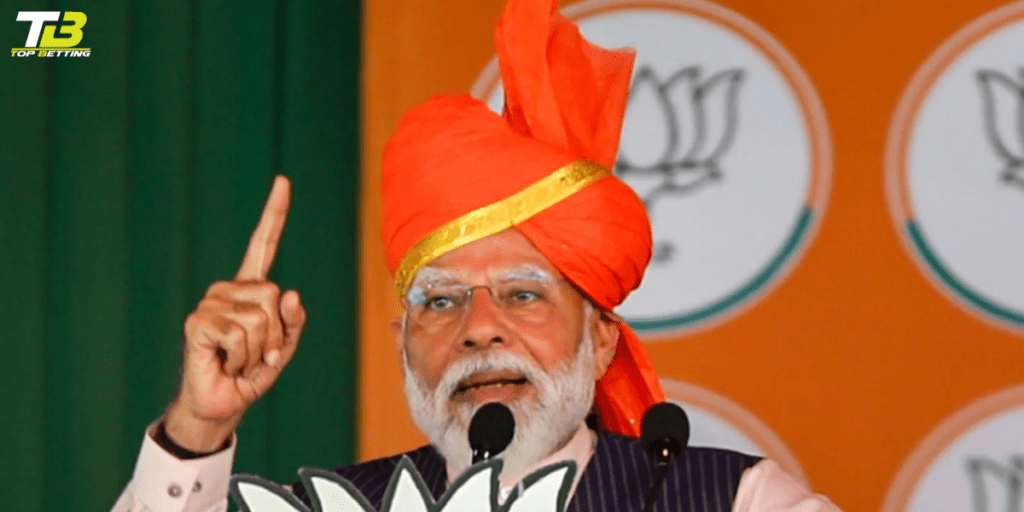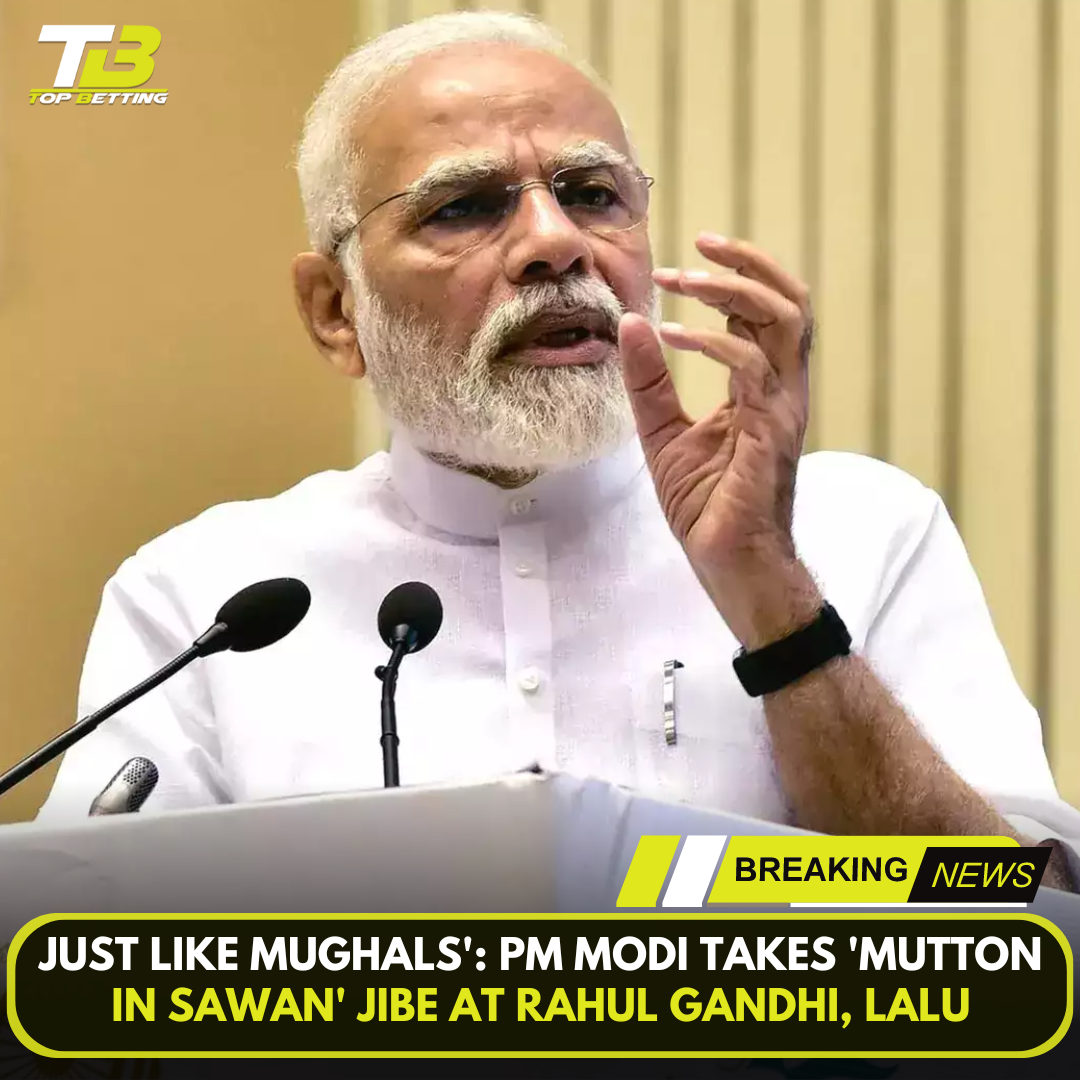
Modi Mocks Rahul, Lalu over Mutton in Sawan Remark
In a recent political rally, Prime Minister Narendra Modi took a playful jab at opposition leaders Rahul Gandhi and Lalu Prasad Yadav, comparing them to the Mughals. Drawing upon history, PM Modi used the occasion to mockingly criticize Gandhi and Yadav’s political strategies, suggesting that they were following the footsteps of the Mughal rulers. The remark brought a wave of laughter and applause from the crowd, showcasing yet again PM Modi’s wit and knack for wordplay.
Using historical references to make a point has become a trademark for Prime Minister Modi, as he effortlessly blends humor with political commentary. This particular jibe, centered around the idea of “mutton in Sawan,” displays his ability to capture the attention of his audience and wield humor as a weapon in the political arena. While some may see this as a light-hearted moment, it serves as a reminder of the ongoing political tensions between the ruling party and the opposition leaders. As the political landscape continues to evolve, PM Modi’s tongue-in-cheek remarks only add to the intrigue and excitement surrounding Indian politics.
Historical Context: The Mughal era and its influence in India
To understand the significance of Prime Minister Modi’s jibe at Rahul Gandhi and Lalu Prasad Yadav, it is important to delve into the historical context of the Mughal era and its influence in India. The Mughals were a dynasty of Muslim rulers who reigned over the Indian subcontinent from the 16th to the 18th centuries. They left a lasting impact on Indian culture, architecture, and politics.
During their rule, the Mughals established a highly centralized and powerful empire, known for its grandeur and opulence. They introduced Persian and Central Asian cultural elements, including the Persian language, architecture, and culinary traditions, which had a profound influence on Indian society. The Mughals were also known for their military prowess and strategic political alliances, which allowed them to expand their empire across vast regions of India.
PM Modi’s Reference to the Mughal Era in His Statement
Prime Minister Modi’s reference to the Mughal era in his statement is not a new tactic in his political repertoire. He often draws upon historical events and figures to make a point or to criticize his opponents. By comparing Rahul Gandhi and Lalu Prasad Yadav to the Mughals, PM Modi is suggesting that they share similar characteristics with the Mughal rulers, particularly in their approach to politics.
The comparison to the Mughals can be seen as a veiled critique of Gandhi and Yadav’s perceived autocratic tendencies and an attempt to portray them as disconnected from the realities of modern India. PM Modi’s choice of analogy is strategic, as it taps into the historical consciousness of the Indian people, who are familiar with the Mughal era and its impact on the country.
Understanding the Sawan Festival and Its Significance in Hindu Culture
To fully grasp the implications of Prime Minister Modi’s “mutton in Sawan” analogy, it is necessary to understand the Sawan festival and its significance in Hindu culture. Sawan, also known as Shravan, is the fifth month of the Hindu calendar and is considered auspicious. It is dedicated to Lord Shiva, one of the most revered deities in Hinduism.
During the month of Sawan, devotees observe fasts and engage in various religious activities to seek the blessings of Lord Shiva. It is believed that offering prayers and abstaining from certain activities during this time can bring prosperity and fulfillment of desires. The festival holds great cultural and religious significance for Hindus, and it is a time of heightened devotion and spirituality.
PM Modi’s Use of the “Mutton in Sawan” Analogy
Prime Minister Modi’s use of the “mutton in Sawan” analogy is a clever wordplay that combines the historical reference to the Mughals with the cultural significance of the Sawan festival. By suggesting that Rahul Gandhi and Lalu Prasad Yadav’s political strategies are as out of place as mutton being consumed during Sawan, PM Modi is implying that their actions are ill-timed and inappropriate.
The analogy serves to highlight the perceived disconnect between the political strategies employed by Gandhi and Yadav and the needs and aspirations of the Indian people. It presents a contrast between the traditional values associated with the Sawan festival and the actions of the opposition leaders, painting them as out of touch with the sentiment of the masses.
Interpretation and Analysis of the Jibe
PM Modi’s jibe at Rahul Gandhi and Lalu Prasad Yadav can be interpreted in multiple ways, depending on one’s political perspective. Supporters of Modi’s party may view it as a witty and effective way to criticize the opposition leaders and highlight their alleged shortcomings. They may see it as a demonstration of PM Modi’s quick thinking and ability to resonate with the audience.
On the other hand, critics of PM Modi may argue that his jibe is nothing more than a diversionary tactic, intended to deflect attention from pressing issues and engage in personal attacks. They may view it as a continuation of the divisive rhetoric that has characterized Indian politics in recent years, further polarizing the electorate.
Reactions from Rahul Gandhi and Lalu Prasad Yadav
As expected, Rahul Gandhi and Lalu Prasad Yadav did not take Prime Minister Modi’s jibe lightly. They responded with their own counterattacks, accusing PM Modi of resorting to personal attacks and diverting attention from the real issues facing the country. Their responses highlight the tense relationship between the ruling party and the opposition, with both sides engaging in verbal sparring to gain the upper hand.
Gandhi and Yadav’s reactions also underscore the importance of political rhetoric in shaping public opinion and influencing voter sentiment. In an era dominated by social media and instant communication, politicians must carefully craft their messages to resonate with the masses and gain their support.
Social Media Response to PM Modi’s Statement
PM Modi’s jibe at Rahul Gandhi and Lalu Prasad Yadav quickly gained traction on social media platforms, with users expressing a range of opinions and emotions. Supporters of the ruling party hailed the statement as a masterstroke, praising PM Modi’s wit and ability to connect with the masses. They shared the video clip of the rally and used hashtags to amplify the message.
However, there were also those who criticized PM Modi for using personal attacks and diverting attention from pressing issues. They accused him of resorting to cheap tactics and called for a more substantive political discourse. Social media platforms became battlegrounds for heated debates and discussions, highlighting the polarized nature of Indian politics.
Political Implications and Impact on the Upcoming Elections
PM Modi’s jibe at Rahul Gandhi and Lalu Prasad Yadav has significant political implications, particularly in the context of the upcoming elections. Political rallies and public speeches play a crucial role in shaping public opinion and swaying voter sentiment. PM Modi’s ability to captivate his audience with his wit and wordplay can potentially translate into electoral gains for his party.
At the same time, the opposition leaders’ responses and their ability to counter PM Modi’s jibes will also be closely watched. The upcoming elections will test their resilience and their ability to connect with the electorate. The Indian electorate is diverse and politically aware, making it essential for politicians to strike the right chord and address the concerns of the people effectively.

Conclusion: The Significance of Political Rhetoric in Indian Politics
Prime Minister Narendra Modi’s playful jab at Rahul Gandhi and Lalu Prasad Yadav, comparing them to the Mughals, highlights the significance of political rhetoric in Indian politics. It showcases PM Modi’s ability to blend humor with political commentary and captures the attention of his audience. However, it also underscores the ongoing political tensions between the ruling party and the opposition leaders.
The use of historical references and cultural analogies adds depth and complexity to political discourse, allowing politicians to connect with the masses on a deeper level. As the political landscape continues to evolve, the role of political rhetoric in shaping public opinion cannot be understated. It is a powerful tool that politicians employ to gain support, sway voter sentiment, and ultimately shape the destiny of the nation.











